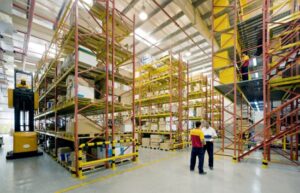A career in logistics and supply chain means facilitating the movement of goods and services according to supply demand. It is a broad industry with a variety of opportunities for both early and seasoned career professionals. If you are interested in a career in logistics, it is helpful to understand the various different careers in logistics to help shape your career choice. In this article, we describe the supply chain and logistics industry, useful information for deciding if a career in logistics is for you, and 11 different logistics jobs, primary duties, and average annual salary.
What is a Career in Logistics?
A career in logistics has many similarities with the responsibilities of the road transport industry, but logistics jobs do not focus solely on freight transport. Logistics is the movement and organization of goods and inventory from one destination to another to meet the demands of suppliers and consumers. This includes moving raw materials and goods to products and can range from manual tasks to clerical and knowledge-based tasks. A career in logistics can be undertaken as an in-house employee or for a third party managing the contract for logistics services with other businesses. Logistics business covers the following areas:
Customer Service
Customer service is vital at all stages of logistics, as customers’ needs must be met throughout the product lifecycle. Depending on the product and service, customers can also be notified while their orders are being processed and completed, as seen in the automotive industry.

Supply
Procurement is an important component of logistics and includes sourcing the materials needed to manufacture the products. This part of the supply chain is responsible for sourcing and purchasing raw materials, auxiliary materials and operating supplies to assist the manufacturing process.
Storage
Warehousing is the safe storage of goods in a warehouse where preparation for packaging and shipping takes place.
Stock
Warehousing dependent warehousing is the key to warehousing to ensure that the supply of goods meets the demand in a timely manner that can be easily supplied.
Inventory
Inventory is a complete list that tracks all the content, items, and products the business wants to sell in one main location or database.
Transport
Transport is the last stage of logistics business, it is the transportation of goods from one place to another by various modes of transport.
What Skills Are Needed for a Career in Logistics?
Logistics jobs require many different skill sets to cover a variety of roles, some of the main skills that can be useful include:
Innovation
Logistics relies on innovation to find new and more efficient ways of working. The industry is constantly evolving and evolving, so an innovative mindset is valuable.
Communication
Communication skills provide clarity and efficiency in logistics. You can use written and verbal communication to collaborate and inform various teams throughout the supply chain.
Data Analysis
Working on complex mathematical formulas to solve a problem is important in logistics. Data plays an important role in the logistics and supply chain industry, so being able to analyze and understand data sets is beneficial.
Leadership
Leadership is useful in most jobs, as the ability to lead a team or process is useful to drive continuity and improvements in the supply chain. Effective leadership skills can help you advance your career into managerial, senior positions.
Critical Thinking
Critical thinking can be a useful way to try a new process. Logistics jobs require innovation to improve the supply chain, the ability to critically examine a new process can be vital to eliminate potential problems.

Result oriented
Employees in the logistics sector work towards goals to get results. It is always a plus to constantly find new ways to achieve and exceed these results in faster and better ways.
Adaptability
Adaptability and agility are useful in logistics as processes are constantly changing. The ability to adapt to new ways of working and new processes is a very useful skill.
Teamwork
Logistics relies on multiple teams and individual employees to keep the supply chain running smoothly. Being able to work collaboratively with different teams is a skill set that can take you far in logistics.
Accountability
Everyone on the team plays a vital role and processes struggle to run smoothly without accountability. Being responsible and holding yourself accountable within your respective role supports the overall success of the supply chain.

Which Qualifications are Useful for Sustaining Logistics Business?
Depending on your career goals, there are logistics careers suitable for all education levels. Some of the required qualifications are:
Associate Degree
An associate’s degree in logistics can provide access to more opportunities than a high school diploma, offering inventory and logistics opportunities.
Licence
You can enter management roles with a four-year Bachelor of Business Administration in logistics and supply chain management.
Master Degree
Further education as master’s levels provides access to opportunities with greater responsibilities such as supply chain management and purchasing and purchasing management.






